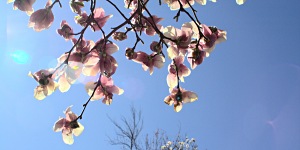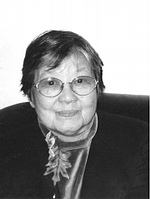Yuri Shigeura, 1919-2012
After my father died, I took Mom on a tour of retirement homes in the Bay Area. She would be able to go to concerts and plays, and most importantly, she would be safe, near John and me. When that didn't work, I had a separate unit built into my house in Oakland. When I expressed my concerns she maneuvered through them like the Japanese women's soccer team moving toward a goal–until I finally got it. She was going to live her life as she wanted to in her own home.
This past June I visited Mom. We walked a half mile along the Hudson. Her garden was lush, in the shift from spring flowers to summer, and she worked on her jewelry. I noticed the Sunday Times crossword puzzle had slipped out of her routine, but she was still driving, seeing friends, managing her life perfectly fine.
At the end of October the backpain that had been diagnosed as arthritis intensified. A CAT scan revealed tumors pressing on her nerves–lymphoma. At her first meeting with her oncologist, he asked how her general health was. She said, “Pretty good.” I told him, “The last time my mother was hospitalized was in labor and delivery in 1953.” The only time I remember Mom sick in bed was decades ago, when her face grew puffy, eyes almost swollen shut—an allergic reaction to eating swordfish.
Just as we got the pain from the lymphoma under control, chemotherapy caused debilitating fatigue. She felt her way of life and strength ebbing away. She loved to sit in the morning sun in the window facing her garden. In late afternoon, I lifted her swollen feet in front of the fireplace.
Chemo depresses the immune system–a common intestinal bacteria raged out of control. Yuri Nishi Shigeura died on December 2nd, 2011
But a few bad days cannot unravel 93 years of life.
Mom was born in Salinas, California. Her father, Hakuo Nishi, was the rare Japanese non-conformist and adventurer who left his homeland for America, returning for a picture bride, Masago, who poetry in classic Chinese calligraphy, but a divorcee with a son she left behind. For both of them, America was the land where only your future counted. As Japanese were not allowed to own land, Hakuo rented farmland, grew wheat, sugar beets, and lettuce for the market, and the family grew squash, artichoke, and daikon in a garden. Hakuo was a cigar smoking big boss, and took great pride in settling other Japanese immigrants into the thriving Japanese American communities of the Bay Area. There was even, briefly, a 'Nishi Lane' in Salinas.
In the spring, when the hills were covered with orange poppies and wild mustard and blue lupines, Hakuo and Masago, and their children, Sumio, Kenji, Yuri, and Fuji, would pick mushrooms in in the wooded vales. The children collected chicken eggs in the barn manger and pigeon eggs near the rafters. They swung on ropes falling into the hay. Climbing into Hakuo's town car, they traveled through farmland and fishing villages to San Francisco to shop. Mom and her mother would sit talking with their feet up before the potbelly stove on chilly California nights. Mom got an AA in Fine Arts.
The Nishis lost their home, farm equipment, and many family heirlooms, saving only what they could carry in suitcases, when the Japanese were forcibly removed from the West Coast after Pearl Harbor. They were stationed in Poston II War Relocation Center in the Arizona desert. To brighten up the bleak barracks, surrounded by barbed wire and constantly infiltrated by desert dust storms, they grew a garden and made home-made decorations. Mom sketched, and worked as a school teacher.
When released from camp, the family moved to Chicago. Mom met Harold Shigeura at a social club. He had cut sugar cane in Hawaii and worked his way through UC Berkeley as a Japanese gardener (the day-laborers of the thirties), and Mom was impressed that he was focused on becoming a biochemist. They moved to New York and lived in Shanks Village, army barracks converted to family housing, surrounded by forest. It was a wonderful place for John and I. We swung on vines like Tarzan and caught box turtles and bullfrogs, but it was also one of the few communities in post-war America that had whites, blacks, and Asians, post-docs on the G.I. Bill like my father and pipe factory workers. Mom brought in money drawing fashion designs for newspapers. Living there reflected and shaped my parents' values of respect and care for all people.
My parents saved and bought our house in Palisades, with Japanese and modernist lines and profile, that merged into the surrounding woods. While my father did medical research, Mom infused the house with paintings, ceramics, and furniture that expressed a Japanese, finely crafted sensibility.
My parents guided John and me by example. We were expected to do the right thing without being told. At the height of the sixties and seventies, when both John and I were involved in radical politics, my parents were very worried, but understood we had to make our own decisions.
My friends, hippies and radicals, Latino and West Indian guys from the hood, took to my mom. She made them shabu shabu at the table, heated by coals from the fireplace. Mom picked blueberries in Cape Breton, and hiked with my father in the Rockies and Alps. While my father fished streams in the Catskills and Adirondacks, she would sketch. She loved talking with, playing games, camping, going to the beach, and to museums with her grandchildren Russell, Angelina, and Gabriel, in New York and California.
When my father developed Alzheimer's, mom watched the man who had always been a provider, husband, and father, devolve into a fog. She was heroic in caring for him.
My brother John was an engineer and inventor, the father of a son who desperately needed him, and a very good and humane man. Mom was 85 when John died of lupus, a reversal of the natural order. John's son Russell and my mother drew closer after John's death, talking on the phone for hours. Russell was brilliant and creative, John's legacy, and our family's. His death five years after John's compounded the tragedy. My mother remained haunted by an underlying sadness. But she was also tough and resilient, and fought hard and gracefully to rebuild her life.
My mother's garden has a Zen quality, carefully nurtured lilies and poppies intermingling with the dogwood my father transplanted from Shanks Village and the native spring beauties and violets. The stream that over millenia has carved out the hollow the house sits in has a simple wooden bridge crossing it. She planted a pine tree for my father and a birch for John. In the summer, looking from the window or sitting on the deck, the house seems to float in the green canopy of ash, maple, and oak.
Mom designed and crafted silver and gold jewelry, and people all over the country are wearing her pendants, earrings, bracelets, and rings. She sewed dresses for Angelina, knitted sweaters and hats for her grandchildren, embroidered and crocheted, cooked Japanese and American food and baked pastries for get-togethers . She played in recorder groups. She sketched her grandchildren, capturing their personalities. She studied the Japanese and botanical drawings, and painted flowers.
Mom connected with her half-brother Akira and his daughter Junko in Japan. She had a close circle of friends, with whom she met for breakfast, went on walks, and attended concerts. She traveled to New
Orleans, Egypt, and Morocco.
She was so solicitous, her two cats, who would sprawl across her bed, one night eased her off the edge and onto the floor. An old friend from Mom's California days, who was blind and widowed, asked Mom to fly out, rent a car, and drive her to see her daughter, who was ill in the hospital. Mom did it immediately.
Mom loved living on her own, while keeping close friendships, from her art school days to new people she met. She helped family and friends when they were suffering, and exulted in their successes. She sent regular contributions to cultural social organizations and to Japan after the Fukushima nuclear disaster. Many people over the years have told me how much they love my mother, respect her, and have been influenced by her. I feel her spirit survives, in me, in my children, and in all of you who knew and cared for her.


